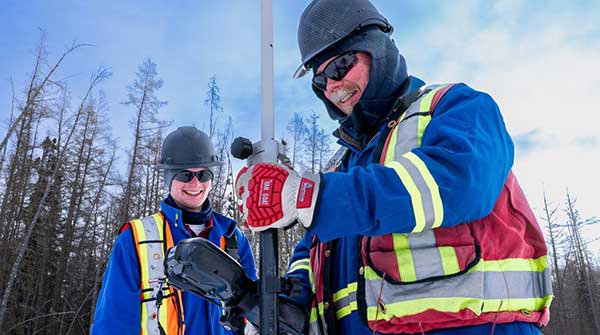Engineering firm Wood awarded contract to begin design
 Canada’s oil sands producers have taken a $10 million step to advance building one of the world’s largest carbon capture and storage (CCS) projects.
Canada’s oil sands producers have taken a $10 million step to advance building one of the world’s largest carbon capture and storage (CCS) projects.
Engineering firm Wood will now begin design work on the 400-km pipeline to be the project’s backbone, connecting an initial 14 oil sands facilities to a storage hub in northern Alberta.
The project, being developed by the Pathways Alliance, is expected to remove up to 12 million tonnes of emissions annually by 2030, at a cost of $16.5 billion.
Based in Scotland with a long history in Canada’s oil sands, Wood has designed and managed more than 600,000 kilometres of pipelines around the world, the company says.
 In northeastern Alberta, workers survey the location for the proposed Pathways Alliance carbon capture and storage project in preparation for regulatory submissions later this year. |
| Related Stories |
| Carbon capture a ticket out of poverty for Indigenous communities
|
| Let’s be smarter on carbon capture. We won’t get to net-zero without it
|
| Why Canada should embrace carbon-capture projects
|
Most recently, Wood was awarded a grant by NASA to conduct a design study for a pipeline on the moon. Originating from the moon’s South Pole, it would transport oxygen to support a proposed future lunar base.
In Alberta, engineering will help propel the Pathways Alliance to reach its net zero emissions target by 2050.
Wood senior vice-president John Day called the CCS project a “prominent response” to the challenge of reducing emissions while maintaining critical energy supply.
The six companies in the Pathways Alliance represent 95 percent of oil sands production, or about three million barrels per day in 2022, according to Canada Energy Regulator data.
The CCS project is the foundation of the group’s emissions reduction strategy, expected to provide about half of its target to reduce annual emissions by 22 million tonnes by 2030.
Pathways also plans to invest $7.6 billion in technologies like switching to clean hydrogen and electricity to power oil sands operations before the end of the decade.
“There is a tremendous amount of activity going on with the Pathways Alliance,” Imperial Oil CEO Brad Corson said during a recent call with investment analysts.
One hundred and thirty-five experts are doing early environmental work on the CCS project, including aquatic and wildlife biologists, archeologists and paleontologists, Pathways says.
Early engagement is underway with more than 20 Indigenous communities along the proposed pipeline route. Detailed engineering on the storage hub is progressing in a carbon sequestration evaluation agreement with the Government of Alberta.
Pathways plans to file its regulatory application for the CCS pipeline before the end of this year.
Deborah Jaremko is director of content for the Canadian Energy Centre, an Alberta government corporation funded in part by taxes paid by industry on carbon emissions.
For interview requests, click here.
The opinions expressed by our columnists and contributors are theirs alone and do not inherently or expressly reflect the views of our publication.
© Troy Media
Troy Media is an editorial content provider to media outlets and its own hosted community news outlets across Canada.

